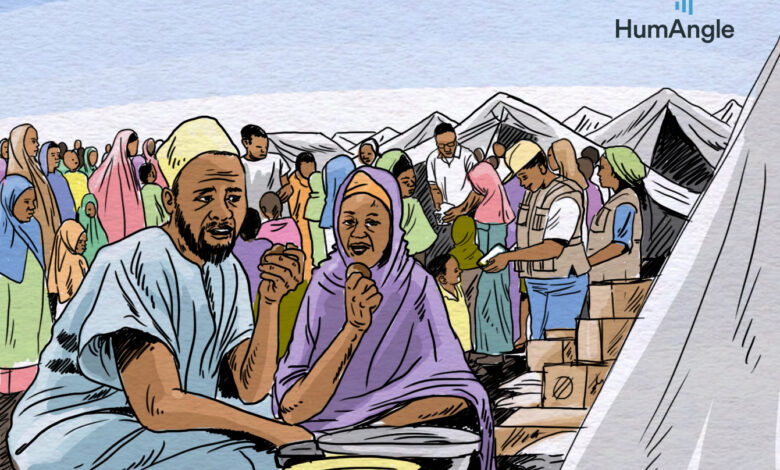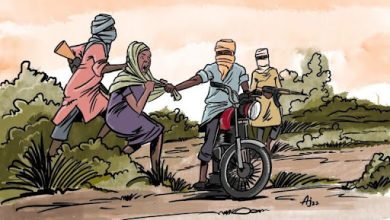Deadly Conspiracy Theories About Aid In Nigeria
Countering misinformation could contain the risks against aid organisations and improve relations between caregivers and beneficiaries in vulnerable communities.

The deeply ingrained prevalence of conspiracy theories about the conflict in northeastern Nigeria continues to undermine the perception of humanitarian organisations and the safety of aid workers.
The dangers of this were exposed this week when a soldier went on a sudden rampage, shooting at a UN-operated helicopter.
On Nov. 17, the soldier on deployment in the Damboa area of Borno opened fire on the helicopter from the UN Humanitarian Air Service (UNHAS) and the aid workers boarding it — causing the death of an aid worker and injuring a pilot. He also killed one of his colleagues who tried to prevent the incident from escalating before the rampaging soldier was shot dead.
According to a source familiar with the incident, the soldier had previously spoken against the role of aid organisations in the region’s protracted conflict.
Close observers in the security and humanitarian sectors say that Post-Traumatic Stress Disorder (PTSD) might play a role. Investigations are, however, still ongoing, and the outcome may shed more light as well as suggest measures to safeguard people working on the frontlines from friendly fire.
But for a long period during the insurgency, campaigns by high-profile officials contributed to the atmosphere of mistrust between aid organisations and the communities they serve, affecting the people’s ability to get desperately needed support, and souring the relationship between the people charged with providing humanitarian aid and the leaders of the communities they are supposed to be helping.
Official threat
The number of incidents demonstrating the atmosphere of mistrust is long. This type of tense relationship with potential impacts on the information environment extends to the military.
Most prominently, in 2017, the military raided the U.N. humanitarian compound in Maiduguri, the Borno state capital. Their erroneous suspicion was that the then Boko Haram leader, Abubakar Shekau, might be hiding in one of the UN buildings.
The military in 2018 suspended the United Nations Children’s Fund (UNICEF) after accusing it of deploying spies who support the insurgents and their sympathisers, the suspension was later rescinded. Earlier that year the military declared three UNICEF workers “persona non grata”.
In 2019, Mercy Corps suspended operations in Yobe and Borno after the military closed four field offices. Days earlier, the Nigerian Army ordered Action Against Hunger to close its offices in the two states, accusing it of “aiding and abetting” terrorists.
Similarly, in 2019, the chairman of the Senate Committee on Army, Ali Ndume, claimed there was evidence that NGOs were collaborating with Boko Haram. Within the same month, the news spread that the Army had recovered an international NGO identity card from a dead insurgent. The real story was that the aid worker had lost his identification during an attack and informed the police.
In 2019, it was also reported that the leadership of the lower parliament met with the country’s security chiefs and were briefed on how some NGOs allegedly aid Boko Haram, although no evidence of wrongdoing against the humanitarian organisations was publicly shared.
Last year, operations of the Agency for Technical Cooperation and Development, commonly known as ACTED, were suspended by the Borno government after the military “discovered” firearms training for staff. Even though it was explained as a routine exercise for aid workers deployed to high-risk areas that used the simulated sounds of gunfire and toy weapons to train staff in situational awareness, the suspension has not been rescinded.
Uncertainties
It’s unclear yet what the long-term impact would look like, but what’s certain now is that the recent attack would affect aid operations and may further shrink access.
The head of mission of one of the humanitarian organisations working in the northeast said, “This latest incident only confirms our fears that there exists deep mistrust between security agencies and NGOs on the one hand and another hand between aid workers and those that benefit from aid interventions.”
He cited the several incidents in the Tigray region where aid workers were targeted by government forces and hoped that lessons would be learned in the northeast to ensure the safety of aid operations.
A few days after the incident, the commander of counterinsurgency operations in the region met with the head of OCHA, Trond Jenson. During the meeting, the commander expressed his condolences and revealed that the military police had commenced an investigation.
The more than a decade conflict has led to tens of thousands of deaths, displaced over two million people, and left over eight million people in need of humanitarian assistance. The government’s inability to manage the humanitarian crisis led to local and international NGOs getting involved in providing medical care, relief materials, and shelter to vulnerable populations.
HumAngle, in a previous report, had noted that the operation of these organisations had an economic ripple effect, “ranging from stimulating cash flow, employment opportunities, professional skill development and regeneration of local businesses.” However, their operations have also been shadowed by disturbing narratives, conspiracies, and misinformation that harm public perception.
Sometimes these stories are shared by people disturbed by the protracted conflict or those who don’t trust foreign donors or aid organisations. The situation has been complicated by online trolls and certain groups shifting the blame to aid organisations. The recent attacks show the psychological and fatal effects of the problem.
Civil society threat
Some civil society groups are also linked to the dissemination of damaging stories. For instance, in 2020, the Centre for African Liberation and Socio-Economic Rights claimed that International Non-Governmental Organisations and some local NGOs were aiding the insurgents.
The group was one of the organisations in a 2021 report on Fake Civil Society and Pro-Government NGOs. The Coalition for Good Governance and Change in 2019 made a similar allegation that some international NGOs were supporting Boko Haram.
The atmosphere of mistrust leads to decisions being made with incomplete information. To some community leaders, power is a zero-sum game, they fear that if they allow NGOs to operate freely, they will inevitably cede some of their own power.
The way the military prosecutes the conflict has also clashed with the way humanitarian organisations operate in war-torn areas. When anyone present in large areas of countryside are considered to be “Boko Haram”, any food or medical aid to civilians still remaining in that area is at risk of being considered aid to Boko Haram.
Insurgents’ threat
Over the past year, humanitarian access to some locations, especially transit routes, has shrunk due to persistent security threats, particularly from the Islamic State West Africa Province (ISWAP). This has necessitated a reliance on the use of helicopters for passenger and cargo movement.
Several areas, especially in northern Borno, remain inaccessible despite the resettlement of thousands of internally displaced persons and refugees in rehabilitated communities.
Insurgents regularly search for aid workers at checkpoints and sometimes storm garrison towns with humanitarian hubs. A few days ago, ISWAP shared pictures of their attack on what they claimed was a “Red Cross” compound in Monguno. However, they had actually attacked a depot belonging to a contractor providing logistics services to the humanitarian aid operations, a private Nigerian company.
The group frequently labels targets associated with aid actors as “Red Cross”, resulting from its hostility against the organisation and as a likely designation to back their action. In addition, it accuses NGOs of working with governments and spreading blasphemous beliefs. These claims have shaped the risks facing humanitarian workers and facilities.
“Many of those organisations fight Muslims in many ways and provide support to the armies and parties fighting them, so they are partners in the fighting, even if their workers do not carry weapons or participate in the battles,” the group said in a brief that was reviewed by HumAngle.
The humanitarian community should be able to assess the information environment around their activities and work with partners. This will build their confidence and allow them to address concerns before they degenerate into violence.
It would require a significant amount of effort to counter disinformation across a broad spectrum of channels and diverse audiences with different grievances. But developing a crisis communication model may be the only sustainable option for millions of affected persons who rely heavily on aid to survive.
Support Our Journalism
There are millions of ordinary people affected by conflict in Africa whose stories are missing in the mainstream media. HumAngle is determined to tell those challenging and under-reported stories, hoping that the people impacted by these conflicts will find the safety and security they deserve.
To ensure that we continue to provide public service coverage, we have a small favour to ask you. We want you to be part of our journalistic endeavour by contributing a token to us.
Your donation will further promote a robust, free, and independent media.
Donate HereStay Closer To The Stories That Matter




